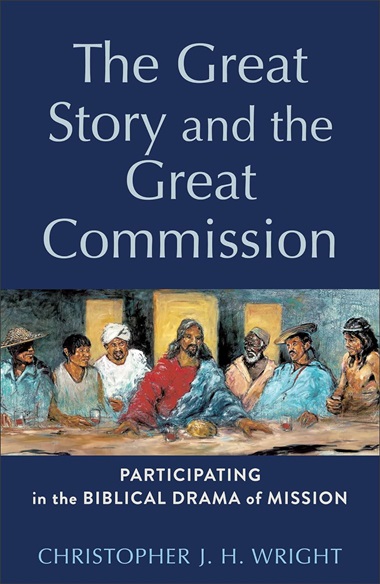
One of several new books about mission. Christopher Wright is a key player in the Lausanne Movement. He and the artwork (‘The Last Supper with Twelve Tribes’ by Hyatt Moore, who lived in Metro Vancouver for several years) were featured at the Cape Town Congress in 2010.
For years I have been urging anyone who will listen to pay more attention to missionary history, learn about missionary saints, read books about missionaries – to little avail. I believe one of my sons once followed up.
But, Paul – in the midst of his missionary journeys –.encouraged perseverance. And the timing seems auspicious, with Mission Fest coming up next month, February 15 – 17. (There’s my local angle!)
Another prompt, as I sit down to write, is the fact that today Open Doors is releasing its World Watch List 2024. So many faithful Christians – often the most missionary-minded – are being persecuted.
And apparently January 21 is World Religion Day, “initiated in 1950 by the National Spiritual Assembly of the Bahá’ís of the United States.” I just read a comment on a ‘progressive’ Christian blog suggesting we join in. He urged us to be open to learning about other faiths, and to do more listening than talking.
Good ideas. But he added, “The greatest sin (if one wants to use that word) is the notion that we are disconnected from God in the first place. For this reason, I no longer try to evangelize people of other faiths.”
That’s more or less what I grew up believing – before some generous people shared the good news with me. Thank God for them. They were missionary farmers who shared what they had been asked to share.
Our Christian history is replete with individuals and communities who have, likewise, shared with their immediate neighbours, and to the ends of the earth. I like to remember them and to think about their legacy.
Thus I will take another run at my missionary-focused proselytizing, with a series of (probably) five articles. Mostly, I’ll look at recently published books. It is encouraging to see that, while most churches and Christian bookstores have largely forgotten missionaries, a few publishers continue to produce some fascinating books. Some are devotional; some are aimed at the Christian public. But many have an academic focus, both from within the Christian community and from secular publishers.
No longer do we see much in the way of hagiography (probably a sign of maturity) and many are critical of the missionary movement. But they do take it seriously, and I hope pastors and other leaders will increasingly follow suit.
Here are the themes I have in mind:
1. History of missions
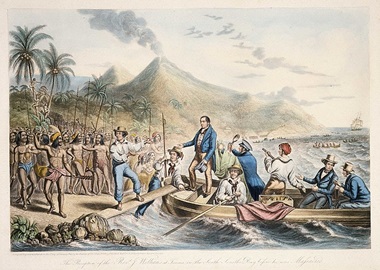
The reception of the Rev. John Williams at Tanna in the colonial New Hebrides, the day before he was killed and eaten in 1839. Oil colour print by George Baxter, 1841.
‘Christianity is a missionary religion.’ A truism, at least it used to be. And should be still.
Andrew F. Walls – along with Lamin Sanneh, pioneering authors in the field of World Christianity – began his posthumously published book, The Birth of the Western Missionary Movement (Eerdmans, 2023), with these words: “There have been many missionary movements in Christian history” – Jews to their relatives and friends; Greeks to their culture; Syrians to what we now call Iraq and well beyond; Copts down the Nile Valley; Celts and Romans to Britain.
And so on. When we think of missionaries, we tend to think of ‘from the West to the rest.’ So do those who conflate imperialism and missions, both within and beyond the Christian community. Most of these new books offer a corrective to that flawed view.
I will offer an overview – very brief, far from comprehensive – of several recent books which consider the history of missionary activity. My focus will mainly be on more recent, and particularly Protestant, missionary activity, but all recent books of any quality point both to the persistence and breadth of missionary activity (with notable lulls) over the centuries.
2. World Christianity
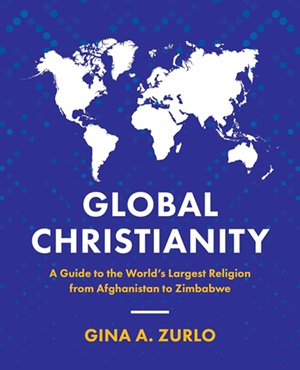 The World Watch List annually alerts us to the top 50 most dangerous nations for Christians. Along with groups such as the World Council of Churches, the World Evangelical Alliance and the Lausanne Movement, they remind us that we are fellow members of a worldwide body of believers.
The World Watch List annually alerts us to the top 50 most dangerous nations for Christians. Along with groups such as the World Council of Churches, the World Evangelical Alliance and the Lausanne Movement, they remind us that we are fellow members of a worldwide body of believers.
The past couple of decades have seen a burgeoning World Christianity (Global Christianity) movement.
The publishers of Gina Zurlo’s Global Christianity: A Guide to the World’s Largest Religion from Afghanistan to Zimbabwe (Zondervan Academic, 2022) rightly make the case that the book ought to be widely distributed, saying:
Global Christianity is an accessible quick-reference guide to the global church. Filled with at-a-glance maps and charts, it puts relevant and up-to-date information into the hands of churches, mission organizations, and individuals. Useful for prayer, missions, outreach and study of the global church, this is the new standard resource on the world’s largest religion.
Last fall I posted an article about Global Christianity.
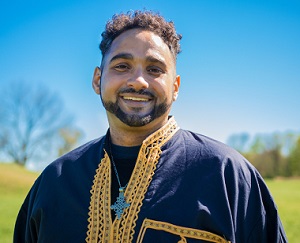
Vince Bantu: “Christianity is not becoming a global religion; it has always been a global religion.”
There is now something of a cottage industry of books on World Christianity, many of which offer valuable challenges to common assumptions. For example, Vince Bantu, who taught a course on ‘The Early Church in Africa and Asia’ at Regent College last fall, wrote in A Multitude of All Peoples: Engaging Ancient Christianity’s Global Identity (IVP, 2020):
Many contemporary missiologists and church historians would have us believe that Christianity came into Africa and Asia from Europe when the reality is quite the opposite in several significant respects. Christianity is not becoming a global religion; it has always been a global religion. . . .
Despite the persisting association of the Christian faith with Western culture/whiteness, Christianity has always been a global religion that spread from Jerusalem in every direction.
And there are many more.
3. Specific areas: Africa, Asia . . .
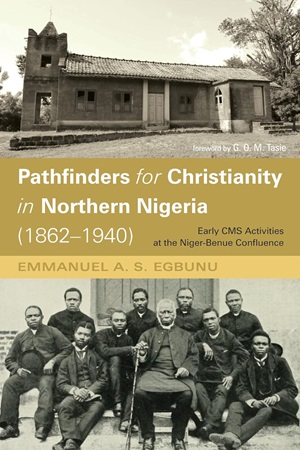 I will survey some new books which focus on missions in various parts of the world. For example:
I will survey some new books which focus on missions in various parts of the world. For example:
- Pathfinders for Christianity in Northern Nigeria (1862 – 1940): “This captivating study significantly extends our insight into the pioneering role of the Nigerian agents of CMS Anglican Church in the introduction of Christianity and Western education to Northern Nigeria, especially during the heyday of colonialism.” (Femi Kolapo)
- Negotiating the Christian Past in China: “Jifeng Liu elucidates the ways in which Christianity has become an integral part of Xiamen, a Chinese city profoundly influenced by Western missionaries.”
- Missions in Southeast Asia: “In this collection of essays, contributors from throughout the region reflect on the history and future of Christianity in Southeast Asia, providing an overview of missions in the region, and exploring how local churches are defining a uniquely Southeast Asian approach to interreligious engagement.”
- Pioneer missionaries are honoured where they devoted their lives in China
- Indian Christianity: deep roots, pioneer missionaries, impressive leaders
- Jan and Fran Boer: 30 years of holistic mission in Nigeria, now in Vancouver
I will also point to a couple of sets of missionary books for young people which I think ought to be required reading for all children. Well, maybe that’s a bit overboard, but I do recommend them!
4. Not so good news?
 This section is, unfortunately, quite well documented. Though we can rightly point to many positive missionary influences – supporting anti-slavery movements, opposing sati (burning widows on pyres with their husbands), and developing schools and hospitals, for example – the picture is often far from rosy. We all know about residential schools in Canada.
This section is, unfortunately, quite well documented. Though we can rightly point to many positive missionary influences – supporting anti-slavery movements, opposing sati (burning widows on pyres with their husbands), and developing schools and hospitals, for example – the picture is often far from rosy. We all know about residential schools in Canada.
Here are a couple of other examples demonstrating the negative, or at best, mixed results of cooperating with national power:
- To Bring the Good News to All Nations: “When American Evangelicals flocked to Latin America, Africa, Asia and Eastern Europe in the late 20th century to fulfil their Biblical mandate for global evangelization, their experiences abroad led them to engage more deeply in foreign policy activism at home.”
- Global Faith, Worldly Power: “Assessing the grand American evangelical missionary venture to convert the world . . .
- Double Crossed: “What makes a good missionary makes a good spy. Or so thought ‘Wild’ Bill Donovan when he secretly recruited a team of religious activists for the Office of Strategic Services. They entered into a world of lies, deception and murder, confident that their nefarious deeds would eventually help them expand the kingdom of God.”
On a somewhat more positive note:
- Protestants Abroad: “Between the 1890s and the Vietnam era, many thousands of American Protestant missionaries were sent to live throughout the non-European world. They expected to change the people they encountered, but those foreign people ended up transforming the missionaries. Their experience abroad made many of these missionaries and their children critical of racism, imperialism and religious orthodoxy . . . [they] left an enduring mark on American public life . . .”
We are living in the wake of that loss of missionary confidence (and of religious orthodoxy), but fortunately the West is no longer at the forefront of the missionary movement. Brazilians, Africans, Koreans and others are now leading the way, no doubt making their own culturally-bound mistakes as they go. But God, in His wisdom, has chosen us as His people.
5. Looking ahead

From ‘The Evangelical Church Interacting Between the Global and the Local’ on the Lausanne Movement site.
“You could say the traditional mission model of ‘the West to the rest’ has been turned on its head.” So said Julie Fitz-Gerald in the Rethinking global mission cover story for the January / February 2024 issue of Faith Today.
Themes include the importance of learning from Christians outside of the West, not least those who are actually coming to Canada, recognizing the burgeoning missionary movements from the Global South, and being more creative in the use of technology, especially in closed or resistant nations.
Dr. Allen Yeh described some of the same themes in his Lausanne Movement article and in his book, Polycentric Missiology: 21st-Century Mission from Everyone to Everywhere (IVP Academic, 2016).
Speaking at the first gathering of the Lausanne Movement – in Lausanne, Switzerland in 1974 – Latin American theologian (and prophet) René Padilla excoriated American cultural captivity and its export around the world through missions (though he acknowledged that other cultures could well suffer from similar issues).
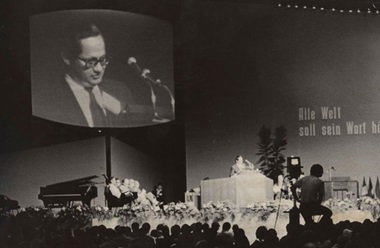
René Padilla urged delegates to the first Lausanne gathering to carefully examine their cultural baggage as they presumed to carry out God’s mission worldwide.
He concluded his talk on Evangelism and the World with these words:
This brings me to a conclusion. Our greatest need is a more biblical Gospel and a more faithful church. We may go away from this Congress with a nice set of papers and statements that will be filed away and forgotten and with the memories of a big, impressive world meeting. Or we may go away with the conviction that we have magic formulas for the conversion of people.
My own hope and prayer is that we go away with a repentant attitude with regard to our enslavement to the world and our arrogant triumphalism, with a sense of our helplessness to break away from our bonds, and yet also with a great confidence in God, the Father of our Lord Jesus Christ, who ‘by the power at work within us is able to do far more abundantly than all we ask or think’. To him be glory in the church and in Christ Jesus, to all generations for ever and ever. Amen.
Padilla’s words have retained their power, and are still reflected in Lausanne’s hopes for the world:
- The gospel for every person
- Disciple-making churches for every people and place
- Christlike leaders for every church and sector
- Kingdom impact in every sphere of society
More to come over the next few weeks.
1. History of Missions
2. State of World Christianity
3. Specific Areas: Africa
4. Specific Areas: Asia
5. Specific Areas: Latin America
6. Not So Good News
7. New Approaches to Missions
